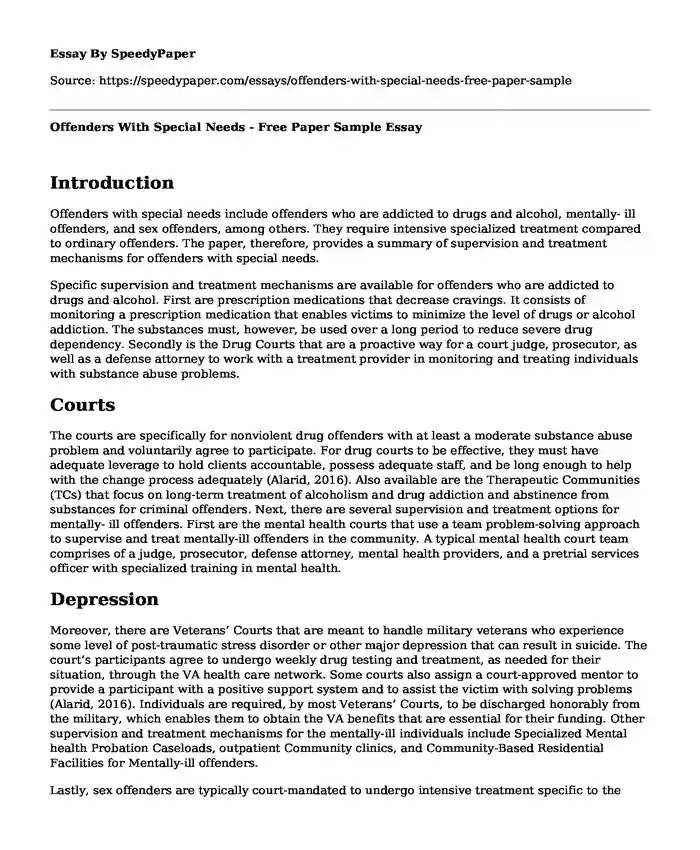
| Type of paper: | Essay |
| Categories: | Abuse Depression Social issue Behavior change |
| Pages: | 3 |
| Wordcount: | 581 words |
Introduction
Offenders with special needs include offenders who are addicted to drugs and alcohol, mentally- ill offenders, and sex offenders, among others. They require intensive specialized treatment compared to ordinary offenders. The paper, therefore, provides a summary of supervision and treatment mechanisms for offenders with special needs.
Specific supervision and treatment mechanisms are available for offenders who are addicted to drugs and alcohol. First are prescription medications that decrease cravings. It consists of monitoring a prescription medication that enables victims to minimize the level of drugs or alcohol addiction. The substances must, however, be used over a long period to reduce severe drug dependency. Secondly is the Drug Courts that are a proactive way for a court judge, prosecutor, as well as a defense attorney to work with a treatment provider in monitoring and treating individuals with substance abuse problems.
Courts
The courts are specifically for nonviolent drug offenders with at least a moderate substance abuse problem and voluntarily agree to participate. For drug courts to be effective, they must have adequate leverage to hold clients accountable, possess adequate staff, and be long enough to help with the change process adequately (Alarid, 2016). Also available are the Therapeutic Communities (TCs) that focus on long-term treatment of alcoholism and drug addiction and abstinence from substances for criminal offenders. Next, there are several supervision and treatment options for mentally- ill offenders. First are the mental health courts that use a team problem-solving approach to supervise and treat mentally-ill offenders in the community. A typical mental health court team comprises of a judge, prosecutor, defense attorney, mental health providers, and a pretrial services officer with specialized training in mental health.
Depression
Moreover, there are Veterans’ Courts that are meant to handle military veterans who experience some level of post-traumatic stress disorder or other major depression that can result in suicide. The court’s participants agree to undergo weekly drug testing and treatment, as needed for their situation, through the VA health care network. Some courts also assign a court-approved mentor to provide a participant with a positive support system and to assist the victim with solving problems (Alarid, 2016). Individuals are required, by most Veterans’ Courts, to be discharged honorably from the military, which enables them to obtain the VA benefits that are essential for their funding. Other supervision and treatment mechanisms for the mentally-ill individuals include Specialized Mental health Probation Caseloads, outpatient Community clinics, and Community-Based Residential Facilities for Mentally-ill offenders.
Lastly, sex offenders are typically court-mandated to undergo intensive treatment specific to the type of sex offense. Their treatment programs use multiple regimens that include cognitive-behavioral therapy to address thinking errors and victim minimization, polygraph tests to detect deception, and aversive conditioning to alter inappropriate sexual interests. Aggressive rapists require a different treatment approach based on anger management than more passive pedophiles, who focus on attachment issues, emotional loneliness, and social skills.
Conclusion
In summary, supervision and treatment of special needs offenders require intensive and coordinated programs. The programs are most effective if they operate with close supervision and cognitive-behavioral treatment intervention. Drug courts are meant for individuals who are addicted to drugs and alcohol, while mental health courts and Veterans’ courts are for those who are mentally ill. Sex offenders are a heterogeneous group that engages in deceptive and manipulative behaviors to lure their victims. They require intensive specialized supervision and treatment, but others need medication to control their hormonal balance.
Reference
Alarid, L. F. (2016). Community Based Corrections. Cengage Learning.
https://books.google.co.ke/books?hl=en&lr=&id=kMQaCgAAQBAJ&oi=fnd&pg=PR5&dq=Alarid,+F.+L.++Community+Based+Corrections+11th+Edition.+PDF&ots=Qnm72dmxxI&sig=mW-pm0m-cAMbTDdxuFi2yJjpuLM&redir_esc=y#v=onepage&q=Alarid%2C%20F.%20L.%20(2016).%20Community%20Based%20Corrections%2011th%20Edition.%20PDF&f=false.
Cite this page
Offenders With Special Needs - Free Paper Sample. (2023, Nov 25). Retrieved from https://speedypaper.com/essays/offenders-with-special-needs-free-paper-sample
Request Removal
If you are the original author of this essay and no longer wish to have it published on the SpeedyPaper website, please click below to request its removal:
- War and Drugs - Essay Sample with the Book Review
- Free Essay: Sexual Harassment Versus Workplace Romances
- Free Essay: Sick Around the World Online Video Essay
- Business Ethics - Free Essay Sample
- Wearing Face Masks as a Measure to Curb the Spread of Coronavirus - Free Essay Example
- Paper Sample: Prevention and Control of Diabetes Type 2
- How Nurses Can Prepare for Global Health Career - Essay Sample
Popular categories




